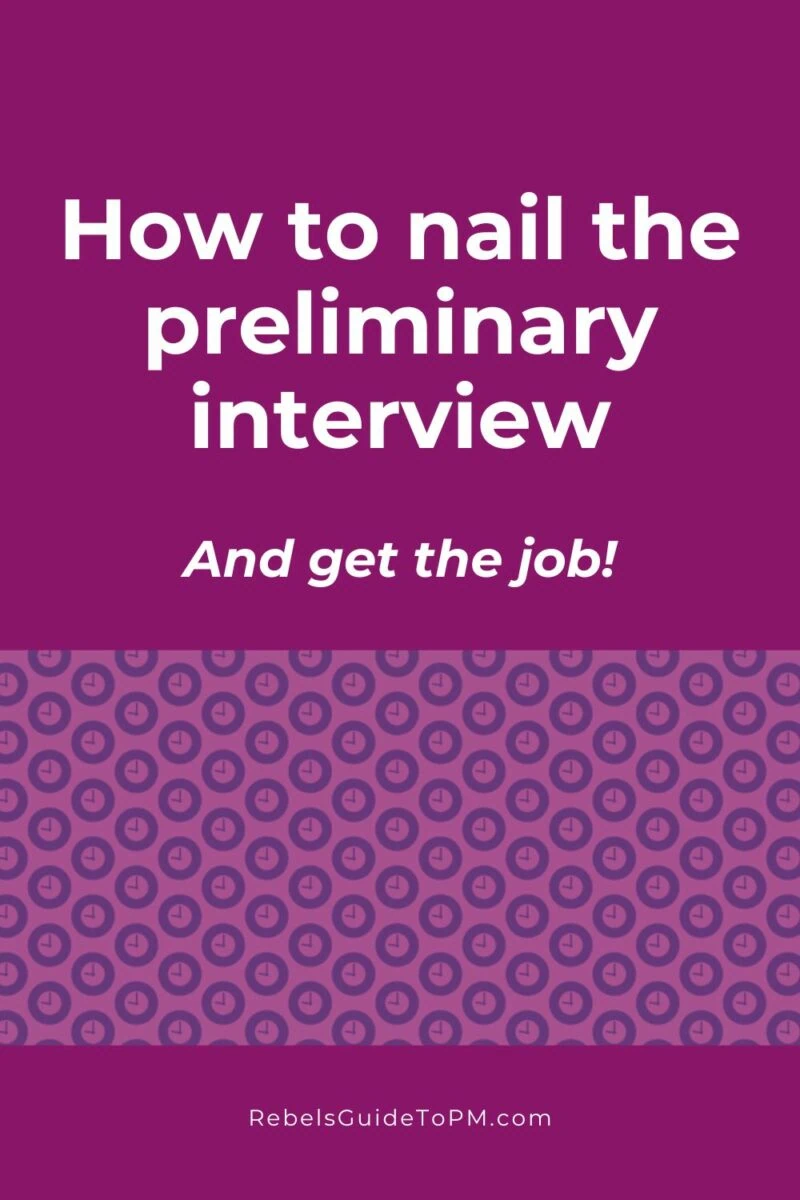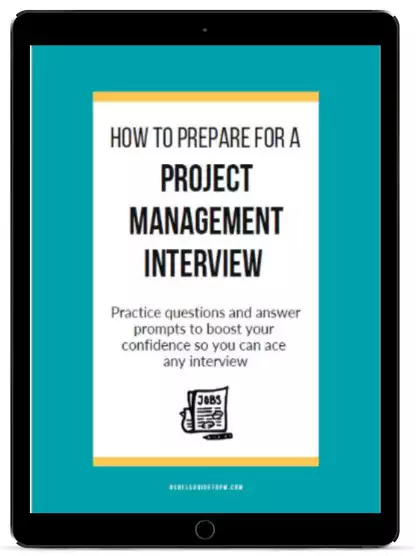How to Nail Your Preliminary Interviews and Get the Job
Years ago I had a brief stint as someone who recruited for our call center, while I was on a graduate training scheme. If I remember rightly, we did phone interviews before bringing people in, because it was a quick way of screening out job candidates that would not be a good fit for the next step in the process and ultimately the role itself.
The preliminary interview step is basically that: a quick screening. It’s nothing to be worried about, and it saves both you and the recruiter time.
Have you been invited to a prelim interview? Let me fill you in on what you need to know to make the most of this opportunity.
What is a preliminary interview?
When you’re job hunting, the preliminary interview is an important step in the process. It’s usually the first time you’ll meet with a potential employer, so it’s a good chance to make a good impression.
A preliminary interview is usually a short meeting, 30 minutes or less. It is often not an in-person interview, instead you speak to the interviewer on the phone. Often the interviewer is an HR person instead of your hiring manager. You’ll likely meet the hiring manager at the next step in the interview process.
The interviewer will ask you a few basic questions about your qualifications and experience. They are trying to screen to see if what you said on the application holds true.
They may also ask you about your career goals and what you’re looking for in a job.
Preliminary interviews are a great opportunity to learn more about the company and the job you’re interested in. It’s also a chance to show the interviewer that you’re a good fit for the position.
Are you preparing for a project management interview? Then this is for you.
This 85-page ebook on how to ace your project management interview gives you everything you need to approach your interview with confidence.
You'll learn my 3-step approach to Prepare, Research, and Practice before you meet the interviewer.
Common preliminary interview questions
What should you expect to be asked in the video chat that could be your first step to a new job? Here are some common questions to prepare for.
- Why does your experience make you a fit for this role?
- What sort of job are you looking for?
- What attracted you to this role in particular?
- Can you confirm your certifications/educational background/qualifications?
- What are your longer term professional goals?
- What type of teams have you worked in before (agile, hybrid, predictive, operational etc)
They might also ask about potential conflicts of interest, especially if the role involves procurement, working with public bodies or anything else that might be a bit of an ethical minefield.
Remember, this is an initial interview. The questions get harder and more thought-provoking as you go through the hiring process, so it’s fine to answer these briefly to keep within the time limit allowed. You can always say, “Would you like me to expand on that?” and if they want to hear more, they’ll let you go on.
Why do employers conduct preliminary interviews?
You spend hours crafting the perfect resume and cover letter, tailoring them to each position you apply for.
Then, you wait anxiously to hear back from the company. If you’re lucky, you’ll get a call or email asking you to attend an interview.
The purpose of a preliminary interview is to help the employer weed out candidates who are not a good fit for the position. They can be conducted over the phone, through video conferencing, or in person.
They usually last less than 30 minutes, and the questions tend to be high level and related to your application and background. Don’t expect any ‘tell me about a time’ competency-based questions at this point.
Sometimes, they’re just a way for employers to save time by only inviting the most qualified candidates for a more formal, longer, in-person (sometimes) interview.
They are also a good way for the company to check out your communication skills. Many roles require you to be able to present yourself professionallly, speak on the phone, communicate clearly and hold a conversation with someone else in a work environment. The interview is a way to check out that you can do all that.
Tips for preparing for preliminary interviews
Congratulations on landing a preliminary interview! This is an exciting step in the job search process, and it means that your potential employer is interested in learning more about you.
So how should you prepare? Here are a few tips to help you prepare for a successful preliminary interview.
1. Do your research
Before the interview, take some time to research the company and the position you’re interested in. This will help you answer questions about why you’re interested in the job and what you can bring to the role.
2. Dress to impress
First impressions are important, so dress professionally for the interview. This shows that you’re taking the process seriously and that you’re ready to work.
Obviously, if it’s a phone interview, that doesn’t apply! Wear whatever you want. I find that I speak more professionally if I’m “dressed up” but I wouldn’t put on my interview clothes for a phone screening.
If it’s an online video call, you’ll definitely want to make sure you look presentable (at least from the waist up!).
3. Be prepared to answer questions about your suitability for the role
The interviewer will likely ask you about your qualifications and experience. Be prepared to talk about your skills and accomplishments.
The easiest way to get consistent answers is to have a copy of your CV, resume or application form in front of you. Who knows what year I took my project management certification? I don’t have that information in my head but I know it’s accurate on my CV. Don’t guess as it makes you look flaky. Just refer to your records. It’s fine.
4. Ask questions
At the end of the interview, be sure to ask a question or two about the company and the job. This shows that you’re interested in the role and that you’re looking for a good fit.
You won’t have a whole lot of time to ask questions as preliminary interviews are normally short and to the point. It’s fine to ask what the next steps will be and when you can expect to hear either way about the decision.
5. Follow up
After the interview, make a note in your diary to follow up after the date they told you they would have made a decision. Don’t chase for an answer before then, but if the date passes and you haven’t heard, it’s OK to ask.
I would assume at that point that I had not been successful – many companies don’t have the time or resource to let all unsuccessful candidates know. I would prefer that they do as I think it’s polite to provide an answer instead of leaving candidates hanging, but there you go.
If you drop the interviewer a note to ask where the decision is in the recruitment process, you may find they haven’t yet got any further. This is more common than you might think – recruiting seems to take an incredible amount of time.
A note on thank you notes: I don’t send them and I don’t expect to receive them. This might be a cultural thing so if you think it’s a nice gesture, do it. I think thanking someone for a 30-minute screening phone call is overkill, but it’s up to you.
Preliminary interviews can be a great way to learn more about a company and the job you’re interested in. By preparing for the interview and impressing the interviewer, you can increase your chances of ultimately getting a job offer.

FAQs about Preliminary Interviews
What happens during preliminary interview?
A preliminary interview is a screening process used by employers to determine if an applicant is qualified for a position. It is usually the first step in the interview process.
Why are preliminary interviews important?
Preliminary interviews are important because they help to determine whether or not a candidate is a good fit for a position. They also help to identify any red flags that may be present.
How do you conduct a preliminary interview?
A preliminary interview is typically a short meeting, lasting no more than 30 minutes, and is conducted by a human resources representative or hiring manager.
The interviewer asks the candidate questions about their work history, education, and skills. The goal of the interview is to identify candidates who possess the minimum qualifications for the position and to weed out those who do not.
How do you know if a preliminary interview went well?
If a preliminary interview went well, the interviewer will likely ask you to come back for a second interview. They may also give you positive feedback about your performance during the interview.
Your next steps
If you’re looking for a way to get the job you’ve always wanted, then learning how to nail your preliminary interviews is a great place to start.
But it’s only the first step on your journey to a new role. Here are some things to do next.
- Check out our 90ish-page resource kit and interview preparation guide, complete with lots of competency-based questions and suggestions on what interviewers are looking for.
- Review the job descriptions of common project management roles so you know what key skills employers expect you to have.
- Find out how to list project management skills on your resume so you can best showcase what you are capable of.
With some preparation and practice, you can make a great impression on potential employers and land the job you’ve been after.
Are you preparing for a project management interview? Then this is for you.
This 85-page ebook on how to ace your project management interview gives you everything you need to approach your interview with confidence.
You'll learn my 3-step approach to Prepare, Research, and Practice before you meet the interviewer.

